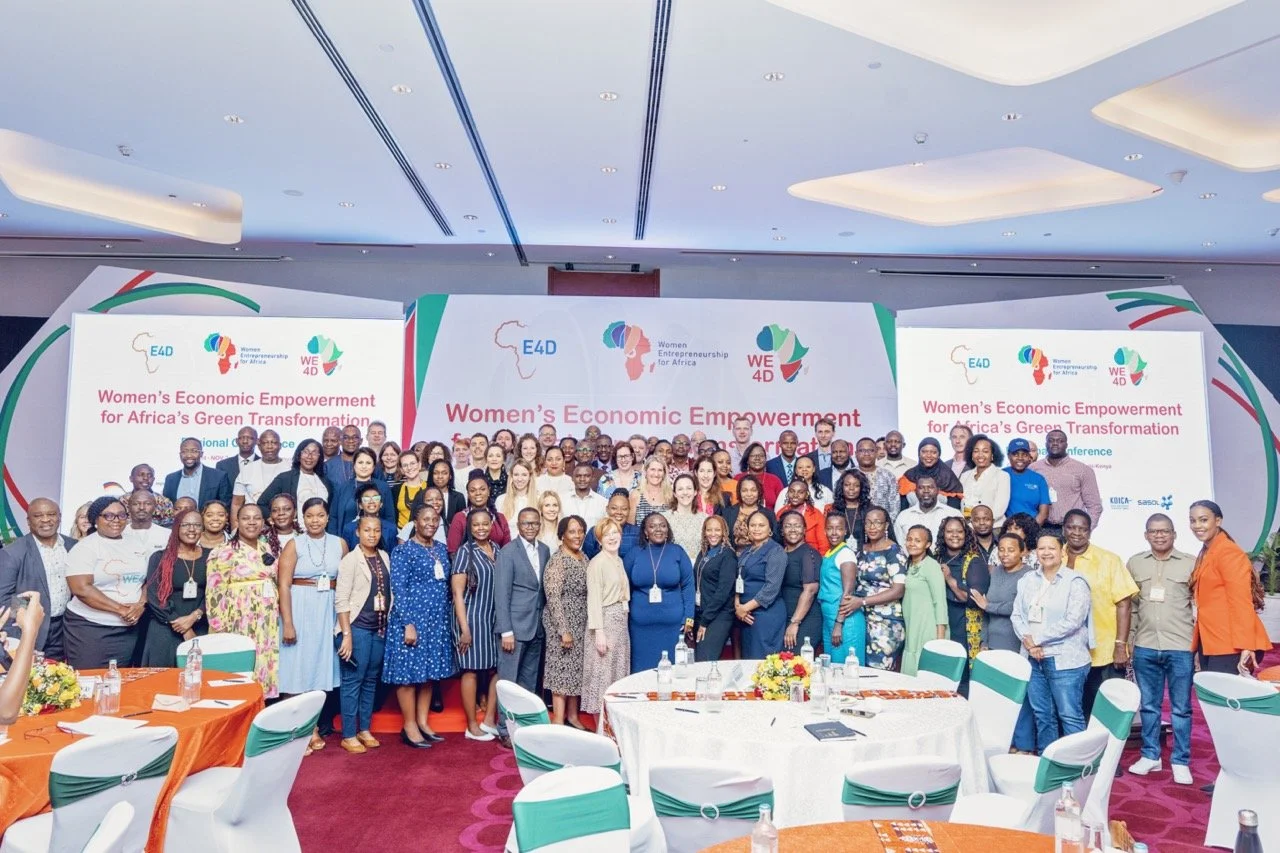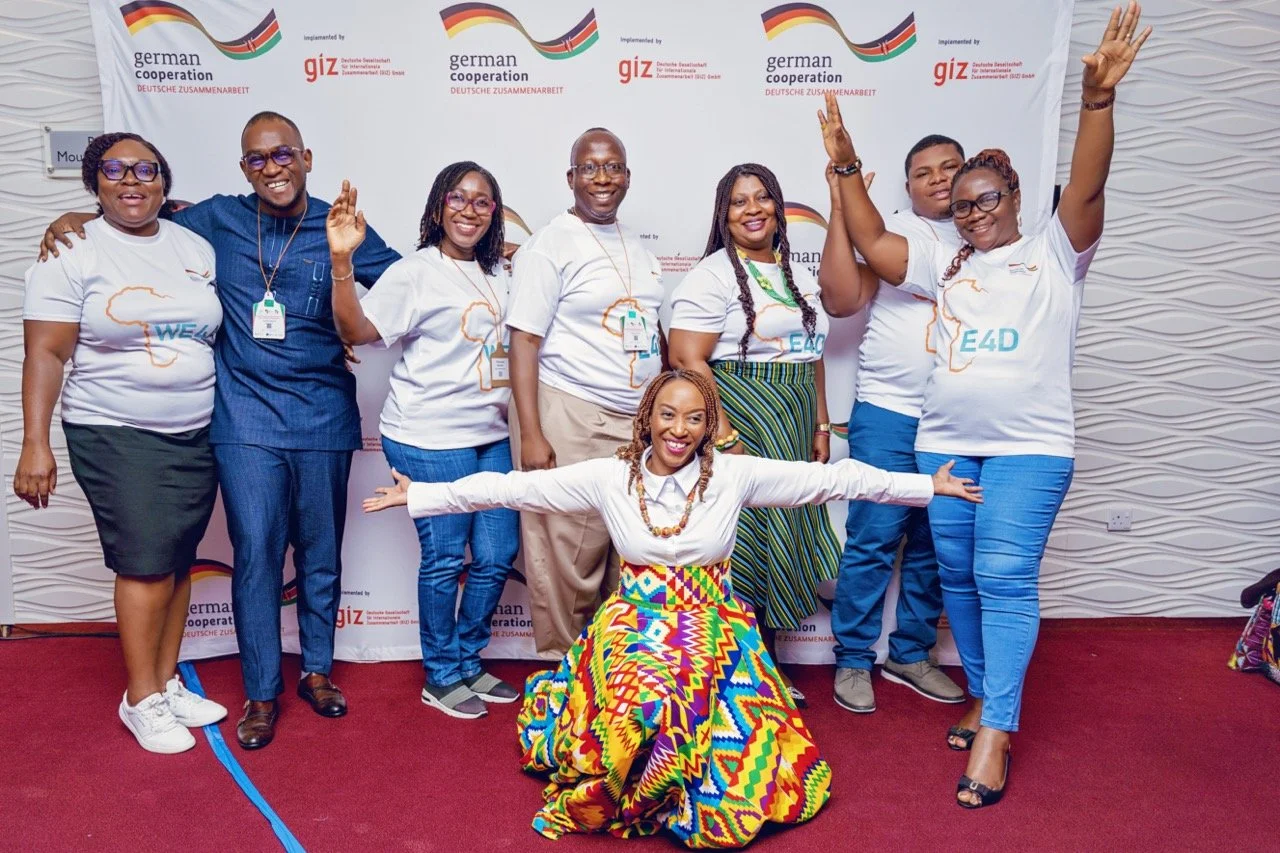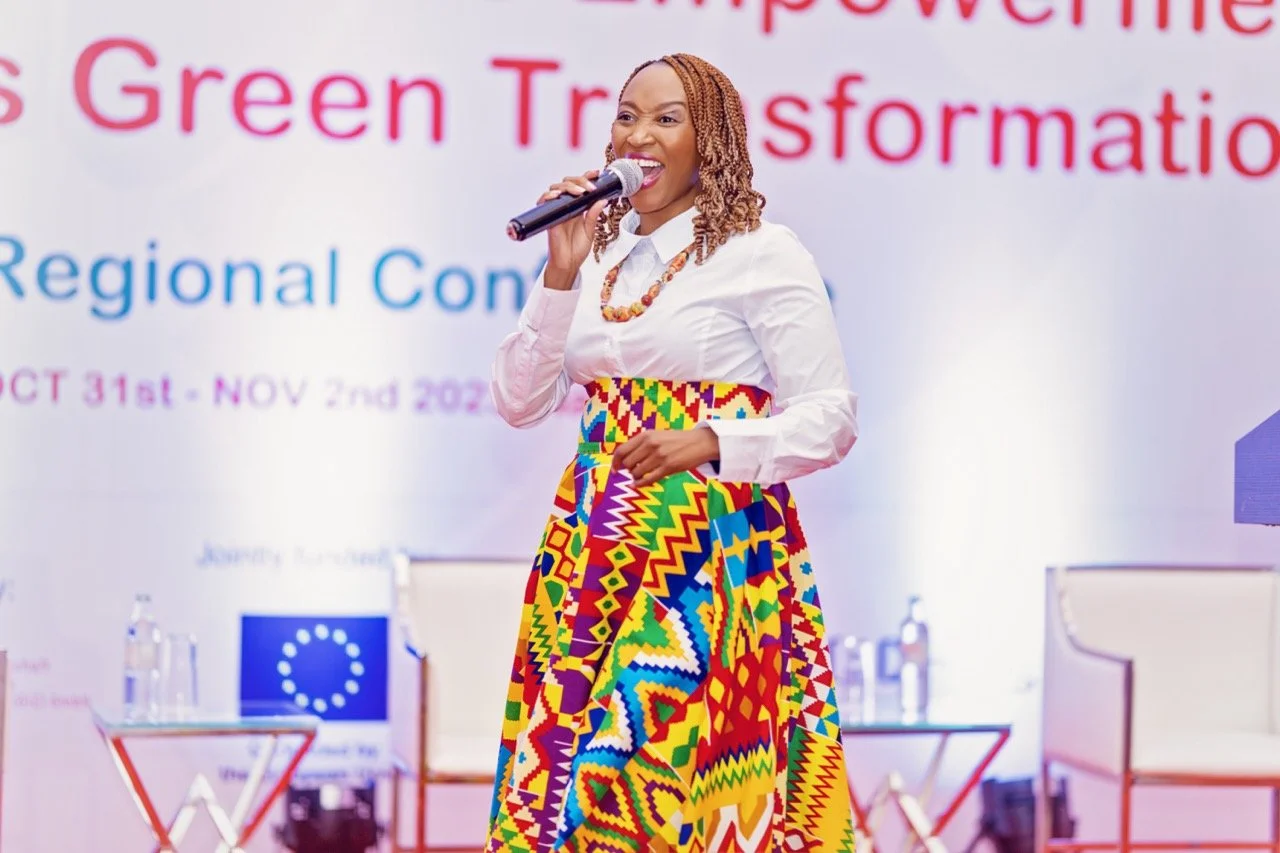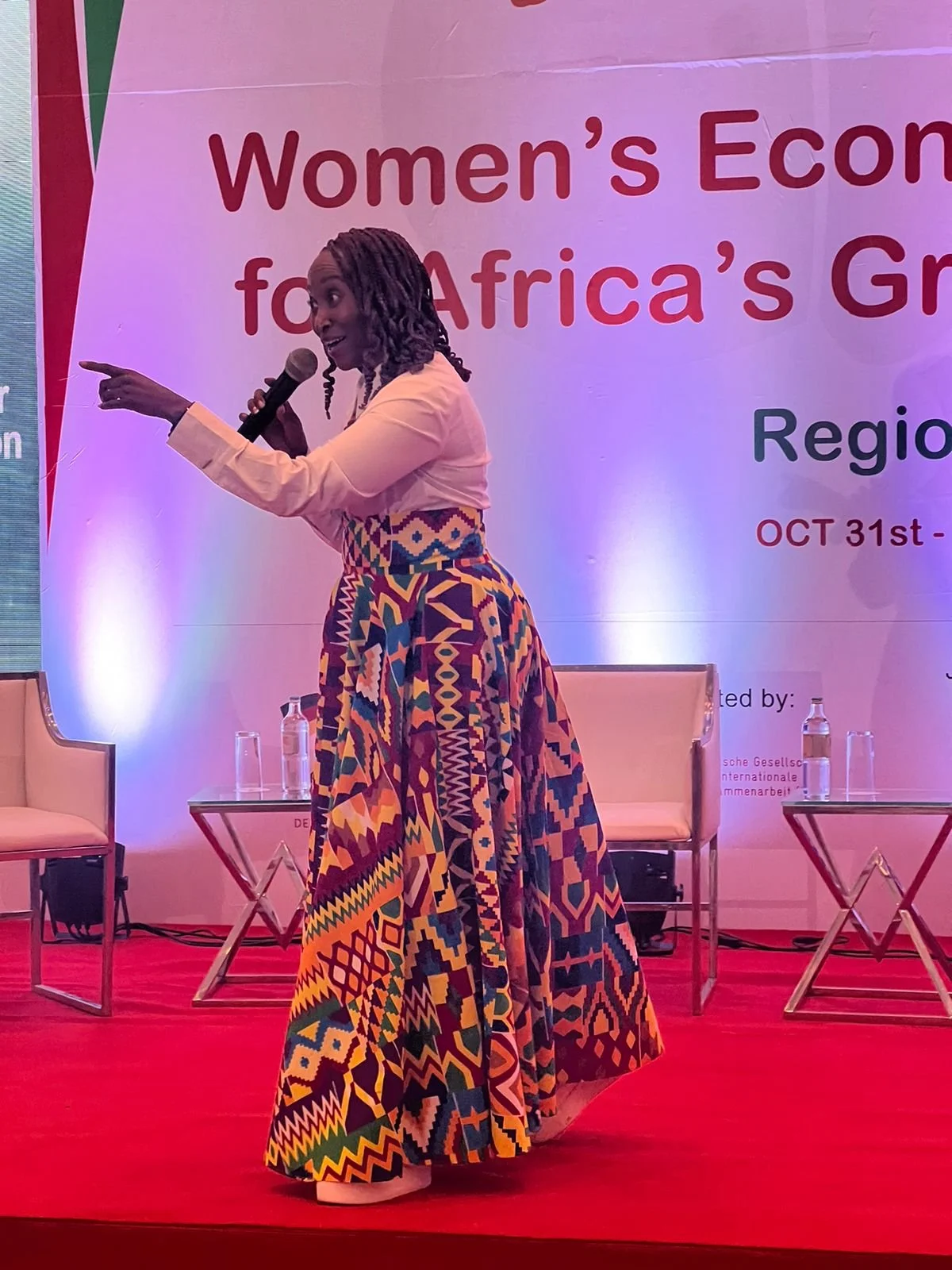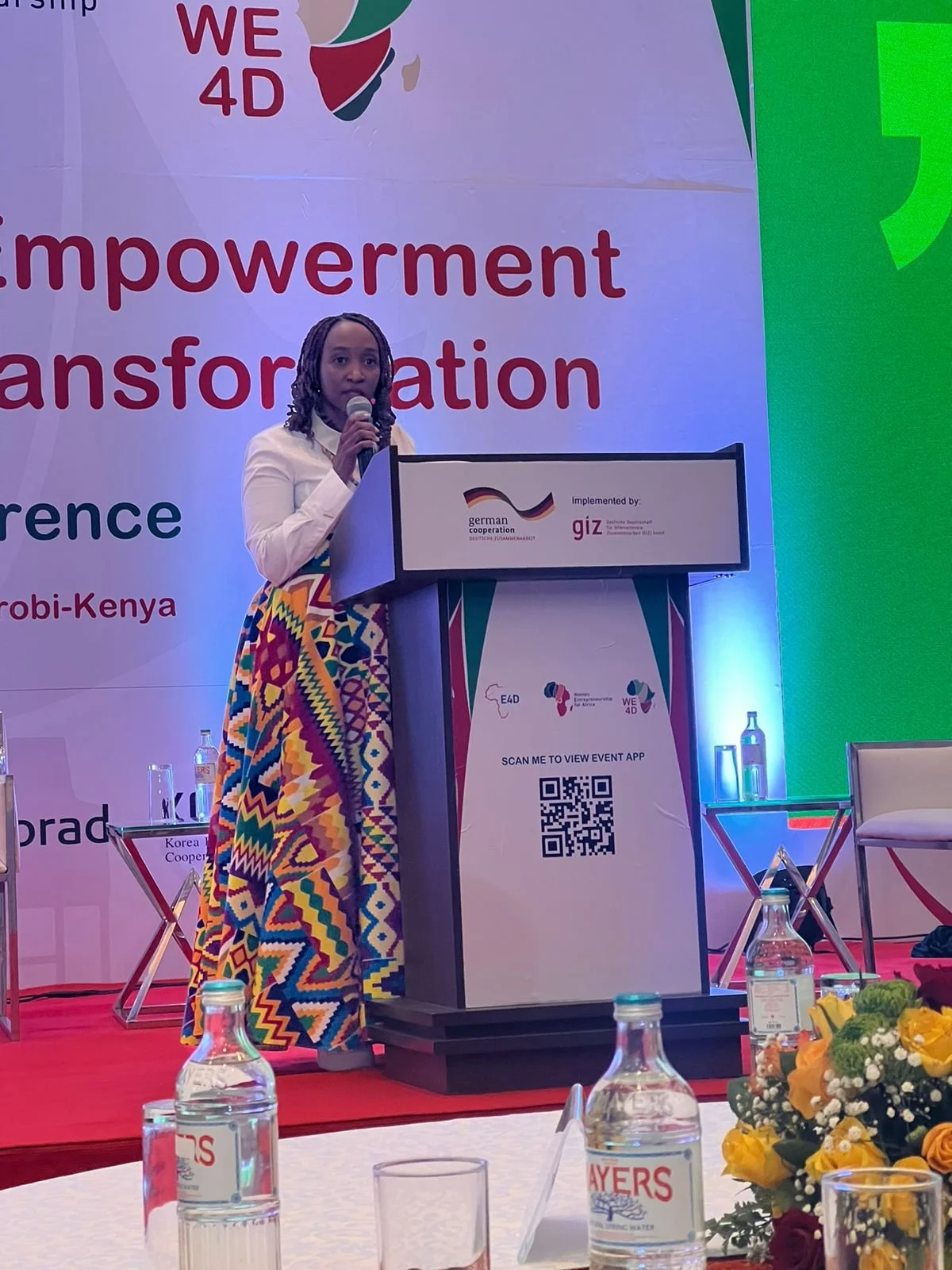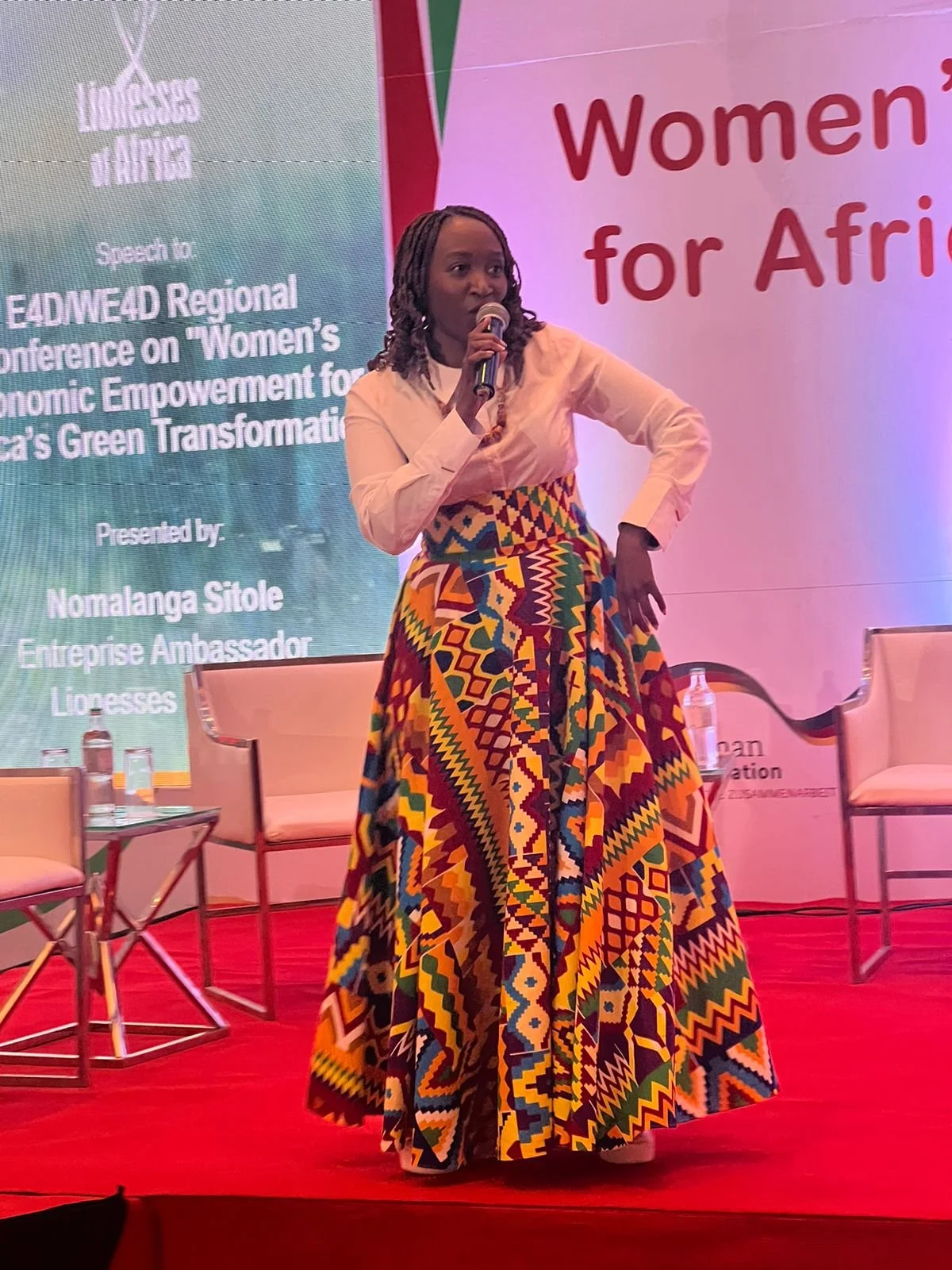by Nomalanga Sitole, Lioness Enterprise Ambassador, Lionesses of Africa
It was an honor to be invited to the WE4D Women’s Economic Empowerment For Africa’s Green Transformation Regional Conference, to speak firstly in my role as the Enterprise Ambassador for Lionesses of Africa, the social impact organisation with a rapidly growing community of 1.7 million women entrepreneurs across the African continent; and secondly as an entrepreneur myself who has first-hand experience that when women entrepreneurs in Africa are empowered to fulfill their potential and succeed, then the continent as a whole will succeed.
The beautiful capital city of Nairobi was our host for the 3-day conference which took place from 31 October to 2 November, with approximately 160 people attending the event, including donors, political partners, private sector partners, implementation partners, and beneficiaries from current E4D partner countries.
The objectives of the conference were firstly to Look back: Reflect on E4D’s and WE4A’s achievements and lessons learnt; mark the end of E4D and the WE4A-pilot; secondly to Get a joint understanding of WE4D’s objectives and identify driving factors that contribute to female employment and the green transformation of the economy; and thirdly to Exchange and Cooperate: Provide an opportunity to exchange with experts, partners and among colleagues about the trends that will shape WE4D and foster partnerships and regional cooperation.
The Lead themes which were part of panel discussions, keynotes and networking included the following:
What have we achieved and learnt in over eight years of joint implementation? How can we contribute to the green transformation of the economy in our partner countries? How do the approaches and focal areas differ in the different partner countries? How can we promote women’s economic empowerment in our projects? What potential for cooperation among our partner countries can we explore?
Day 1 of the conference saw opening remarks from key officials who set the tone for the event on women empowerment in the green economy. The first speaker, Daniel Gunther, Head of Cooperation and Counsellor at the German Embassy in Nairobi, highlighted that the employment promotion for women for the green transformation in Africa (WE4D) contributes to a more robust and diversified economy. This transition from E4D to WE4D amplifies the focus on empowering women for sustainable green driven transformation in Africa. He added that Germany has a strong and explicit new policy – a feminist foreign development policy which means putting women in the centre of all their activities in the foreign policy development space. “We all agree that without women, who constitute 50% of the Global population, there Is no chance of achieving progress in the SDGs and other matrix of social economy.”
He went on to detail the achievement of the E4D program since 2015, having had a significant investment amounting to 165million Euros and the achievement of remarkable results and substantial impact in sub-Saharan Africa with more than 55,000 people in decent jobs, 169,000 people with improved employment situations, and over 165,000 people trained. The programme was implemented between 2015 and 2023 across E4D’s past and present partner countries Cameroon, Ghana, Kenya, Mozambique, Nigeria, South Africa, Tanzania and Uganda. Notably the support extends to over 46000 women and 19000 young individuals.
This was followed by a Keynote address by Martin Wandera the Director of Labour, Employment Occupational Safety and Health in the Ministry of Gender, Labour and Social Development of the Republic of Uganda. He alluded to the Green Economy being the future of the world, and placed emphasis on the need to move away from this being a pipe dream to becoming a reality. His definition of the Green Economy is “to preserve human wellbeing and human economy”. This means creating decent jobs that preserve our economy and energy whilst minimizing waste and pollution.
He encouraged the room to apply a gender lens in greening in agriculture, greening in tourism, the circular economy and waste management, and that women are well positioned in these areas.
His quote – “Empowering Women is equal to Empowering everyone” resonates with our Lioness Community. We often say when you empower 1 woman, 10 other people get empowered too. He made an important call to action to invest in role modelling and to focus on youth – a theme that was highlighted repeatedly in the various panel discussions over the 2 days. His Key note ended off with the words “May our collective efforts be blessed”.
Dr Douglas Tendai Phiri representing NORAD (The Norwegian Agency for Development Cooperation) applauded the timely response of WE4D to green transformation which is needed not just in Africa, but the world over. He shared that NORAD’s strategy which includes Sustainable SDGs, prosperity, peace and justice.
He also highlighted the need to focus on activities that address gender inequality, transformation, important affirmative action and closing the skills gap such as STEM sciences and prioritising food security and human rights.
In his closing remarks, he said: “Imagine a greener future in a world without poverty, it is possible. Human beings can imagine, reflect and dare to do.”
Our next speaker was Katja Rockel, Head of E4D AND WE4D, who took us through the E4D 8-year journey in greater detail with selected milestones, the impact of the program and success stories. One of her presentation slides included this key heading:” AN IMPORTANT LESSON LEARNED – Meaningful partnerships with the right partners are key, a theme that was visibly the golden thread throughout other key note speeches, panel discussions and conversations throughout the conference. Gavin Watson from South Africa who joined Katja on the panel rightfully said – “partnerships are the only game in town.” She ended off her update with the African Quote, “Further Together” - the mantra we live by in our Lioness Community.
The afternoon featured the Marketplace – which allowed delegates speakers and entrepreneurs to get to know each other, learning about E4D projects and networking. We were hosted at an engaging dinner transition event - E4D /WE4D, with a few brief addresses, great local music, dancing and continued networking. The dinner event really gave us the opportunity to let our hair down.
Day 2 included various Keynote addresses and panel discussions linked to the lead themes of the conference. My own Keynote address was after lunch, which we call the ‘graveyard shift’. In true Lioness style, I asked the delegates to get up and dance a little, take selfies and engage in a light-hearted moment. This was well received (I had asked for permission the day before #allprotocolsobserved).
In my Keynote speech, i shared a few stories from our Lionesses of Africa community of women entrepreneurs who are building green businesses that are making an impact in so many ways. Neidy Carvalho the founder and general manager of Imbe-Consultoria, Serviços e Soluções, Lda, also known as Imbe CSS was present at the conference, allowing delegates to put a face to her story and interact with her. Her business is located in Mozambique and in the beginning was focused only on environmental consultancy. However, due to market need the business has since expanded into water treatment, HSQ and renewable and non-renewable energy.
Emi-Beth Aku Quantson, also one of our Lionesses from Ghana whose story has been featured on our online platforms and magazines, showcased her coffee during the Marketplace slot on both days. She is the Founder, CEO and Chief Caffeination Officer at Kawa Moka Coffee Company, Ghana's leading social enterprise coffee company and roaster, where she drives investment and growth. She has raised over $200,000 in debt and equity investments; created over 250 jobs in coffee through farmer partnerships and employment of marginalized groups; and established Accra's largest roastery, supplying major supermarkets and cafes across the country and internationally. Emi-Beth has been recognized by the President of the Republic of Ghana, President Akuffo Addo. Prior to founding Kawa Moka in 2015, Emi-Beth worked as a tax consultant and transfer pricing expert at PricewaterhouseCoopers (PwC) in Ghana and Kenya. Delegates had the opportunity to interact with her and her team and support her through purchasing her coffee. It was truly an honour to have represented the Lioness Community and to have delegates take down notes, presentation pictures having them connect afterwards. My highlight was women telling me they are joining this thriving network and gentlemen promising to send the women in their networks to our community.
The conference came to a close with the official end of E4D and the start of WE4D program led by Katja, followed by a WE4A closing Gala Dinner in the evening, with the Theme - Celebrating Women Economic Empowerment Unleashed: Igniting Women’s Equity and Economic Innovation.
Various partner addresses took place from GIZ, EU, TEF (The Tony Elumelu Foundation) and SAFEEM, and the event flowed with WE4A initiative success stories, panel discussions, testimonials, key notes, and awards.
The “Women Entrepreneurship for Africa” (WE4A) action is a partnership jointly supported by the European Union (EU), the Organisation of African, Caribbean and Pacific States (OACPS) and the German Federal Ministry for Economic Cooperation and Development (BMZ) and is implemented by the Tony Elumelu Foundation (TEF), the Employment and Skills for Development in Africa (E4D) programme of the Deutsche Gesellschaft für Internationale Zusammenarbeit (GIZ) and the Swiss Association for Entrepreneurship in Emerging Markets (SAFEEM). WE4A focuses on increasing the number of African women entrepreneurs who have enhanced business capacities, have access to formal financial services and can take advantage of market opportunities. Beneficiaries in this intervention are businesses managed and owned or co-owned by African women entrepreneurs. Enabling women-led businesses to integrate into local, regional and international value chains is the goal of the WE4A, which builds on the existing Tony Elumelu Foundation Entrepreneurship programme. Empowering women entrepreneurs in order to create more decent jobs in their communities is the objective of WE4A. WE4A combines the expertise of its different partners to create a pathway to success for women entrepreneurs in Sub-Sahara Africa.
The evening ended with the official closing remarks by Elmar Kerck (GIZ), celebrating and congratulating the successes of the passionate women entrepreneurs, highlighting that collaboration, learning and supporting each other throughout their many challenges was the key to their successes. These successes showed that the future that will have more women-led businesses, a future in which women have more rights, resources and representation as men do, and a more just, prosperous and sustainable future.
The 3rd day was mind blowing on the information field visits. I had chosen the SME loop option and I’m thoroughly grateful I did so.
Option 3 Empowering MSME growth: The SME Loop methodology for tailored business development and private sector collaboration - Location: Shamba Connect and Botlogistics. Theme: Green and Social Businesses for Covid-19 Recovery in Kenya.
Who are the Partners (Entrepreneurs) we visited and what makes them unique?
1. Shamba Connect Enterprises, founded in 2018 by Mercy Kilili in Nairobi’s Utawala Estate, is a company with a unique vision for sustainable urban gardening. Shamba Connect Enterprises is led by this visionary entrepreneur who is committed to eco-friendly and circular business practices, emphasizing social and environmental impact. Shamba Connect’s innovative approach involves creating urban gardens from recycled plastics. These gardens are installed in homes and institutions, utilizing limited urban spaces efficiently. The company integrates rabbit farming into its practices for circularity. Rabbit by-products (urine and manure) are transformed into organic fertilizer and pesticides, reducing waste and creating economic opportunities for small-scale entrepreneurs. The company specializes in training and consultancy, with a focus on empowering women and youth to cultivate thriving urban gardens. This ensures a consistent supply of fresh produce and promotes sustainable living. Shamba Connect Enterprises is dedicated to making urban farming a force for positive social and environmental change, leading the way toward a greener and more sustainable future. We saw Mercy’s seedling propagation and urban farming infrastructure site and later learnt Shamba Connect’s business model as a social business during a robust question and answer session. At the end we enjoyed some Kenyan tea and rabbit meat.
2. Bottle Logistics, founded in 2020 by Louisa Gathecha, is a trailblazer in the realm of glass waste recovery and recycling. Specializing in the efficient retrieval of both industrial and post-consumer glass waste, the company processes it into meticulously refined glass cullet, aggregate, and reusable bottles tailored for respective brand owners. Their strength lies in establishing robust collaborations across the entire value chain, guaranteeing the highest possible recovery rates for glass waste. Notably, Bottle Logistics exclusively focuses on recycling hollow glass bottles and jars, omitting window glass and ceramics from their operations. With an unwavering dedication to innovation, Bottle Logistics has emerged as a pioneer in the transformation of the glass waste industry. What sets Bottle Logistics apart is their unwavering commitment to sustainable practices. They have recognized the growing preference for glass packaging due to its unique attributes. Glass packaging is 100% recyclable and can be recycled endlessly without loss in quality or purity. The raw material for manufacturing glass includes sand, soda ash, limestone and cullet (furnace ready recycled glass.) Recycled glass can be substituted for up to 95% of raw materials. Additionally, glass is nonporous and impermeable, preserving the contents and extending shelf life. This material also offers the advantage of being endlessly recyclable without compromising quality or purity, making it an eco-friendly choice. With an array of products, including glass cullet for manufacturing new glass, reusable bottles, and glass aggregate for construction applications, Bottle Logistics is leading the charge in the responsible management of glass waste.
We interacted with Louisa’s social business operating at a larger scale and serving a larger profile of customers - Botlogistics and how she grew business during, after, through and post Covid-19. She currently operates in 3 plants with the aim of including another site and automation for a more effective operation. Her staff count includes over 60% females and a similar percentage of youth employees. We experienced the end-to-end process of receiving, sorting, cleaning the glass bottles all the way to quality assurance before they are packed and dispatched back to their different destinations.
What is the partnership project about?
The overall objective of this intervention was to support 25 social businesses to adapt to new economic reality while promoting green employment capacity through the Covid-19 Build Back Better program. The project supported 25 social business entrepreneurs (35% women owned and 40% youth owned) across Kenya with an intensive and innovative advisory and capacity-building program to ensure a sustainable recovery from the effects of the pandemic. What is the partnership project about? The overall objective of this intervention was to support 25 social businesses to adapt to new economic reality while promoting green employment capacity through the Covid-19 Build Back Better program. The project supported 25 social business entrepreneurs (35% women owned and 40% youth owned) across Kenya with an intensive and innovative advisory and capacity-building program to ensure a sustainable recovery from the effects of the pandemic.
In conclusion – I must say, I have never been more excited to be an African woman in business and having had this opportunity to share a week with like-minded women entrepreneurs from our continent and men supporting us on our journey to impact our communities, and to be able to share my experience as is the nature of our network in regards to story-telling.
My fellow Lionesses, your time Is now. Let us continue to grow and go – “Further Together.”
Nomalanga Sitole
Lioness Lean In Enterprise Ambassador
LIONESSES OF AFRICA
The Pride of Africa’s Women Entrepreneurs


